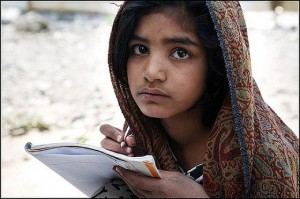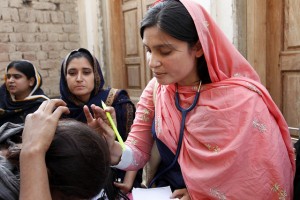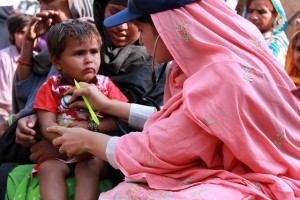“They take it for granted that if you work for an NGO you are funded by the west, that you are trying to change local traditions and customs, you are doing something that is secular. They no longer expect to get any public support, so no effort is being made to win hearts and minds. That is beyond them. Now all they want is to intimidate and pre-empt an uprising against them.” – Malala Yousafazi
Many of you may already be familiar with Malala Yousafazi. Voted one of Time Magazine’s people of the year in 2013, Malala is a young Pakistani girl who has spoken out about the Taliban. Though there is lots of coverage of Malala and her story, what isn’t covered as much is the attacks on many others that followed and that continue to  happen.
happen.
In January, just months after the attacks on Malala, extremists in Pakistan attacked a bus full of health professionals who were on their way home from work. Ultimately six people were killed in the attack – most of them being women. Essentially, anyone who is working to help the country in any secular matter has been targeted by extremists, and their attacks have become more and more common as well as ruthless.
The attack on Malala and on the health workers were just two attacks of many to come. The link between them can be seen in how those attacked were all advocating for the rights of citizens, but furthermore, they had ties to the west, or represented western ideas. What’s important to realize is that education for girls is just a small part of the controversy happening in many countries, and sometimes when there are so many controversies, it becomes hard to know where to focus your support.
The way I see it, the the link to girls education is a small, though crucial part of the picture. For instance, just this week, there was another attack on women riding a bus to school, but unlike Malala’s story, thats not where is stopped. Those survivors that were taken to the hospital had to relive their attack when the  hospital was stormed in continued attempts of harming those originally on the bus. There was also an attack on a teacher showing that it’s not just the girls in danger, but those helping them as well.
hospital was stormed in continued attempts of harming those originally on the bus. There was also an attack on a teacher showing that it’s not just the girls in danger, but those helping them as well.
To me, this means that education for girls is just one of the issues that is plaguing Pakistan, but that achieving a higher level of support would help the country in other ways. Though the country is torn between two points of views, I believe that each small step to unity is going to help the country, but in order to achieve unity we need to support all of the struggles.
It is all too common these days for us to get swept up in helping one cause. As a society, we often forget that in the past struggles have banded together to more efficiently accomplish goals. For example, take women’s rights and temperance, or even women’s rights and civil rights. The times in which we associate great change are the times when causes have come together.
Though it is important to educate girls, it is also important to help create a safe environment for them to learn in. This will never be achievable if all of those trying to help are fearing attack.
There is a large push to educate girls in Pakistan, including a lot of involvement from NGOs. There are also campaigns to help send girls to school, and Malala herself even has her own foundation. Furthermore, the United Nations, along with Gordon Brown, has started a special initiative to tighten safety efforts and support for girls attending school in Pakistan.
However, instead of focusing all of our money and efforts into money for schools and girls (though there is no doubt that is largely important), we can also donate part of that money to health workers and other groups working  to better the Pakistani society.
to better the Pakistani society.
We can no longer focus issue by issue in countries, but instead need to work to help build more cohesive communities, period.
Though it can be more challenging to find ways to help with efforts besides funding schools, organizations such as UNICEF and WHO are increasing efforts to help women in Pakistan and their colleagues. There is also the Human Relief Foundation which features multiple ways to help countries.
Today’s world is one that is increasingly hard to navigate, and that is no different in other parts of the world. In Pakistan, there are many efforts facing those trying to escape the extremists in the country. Though it is crucial to support education for girls (and for boys), it is also important to support those helping them, such as the health workers. No one movement will be able to survive without the help from the others, and that is why we need to advocate for them all.


